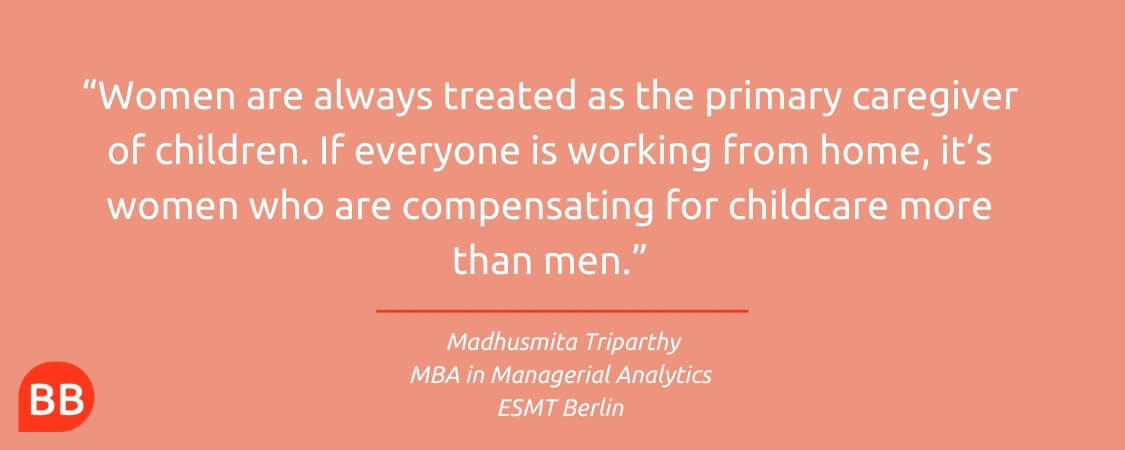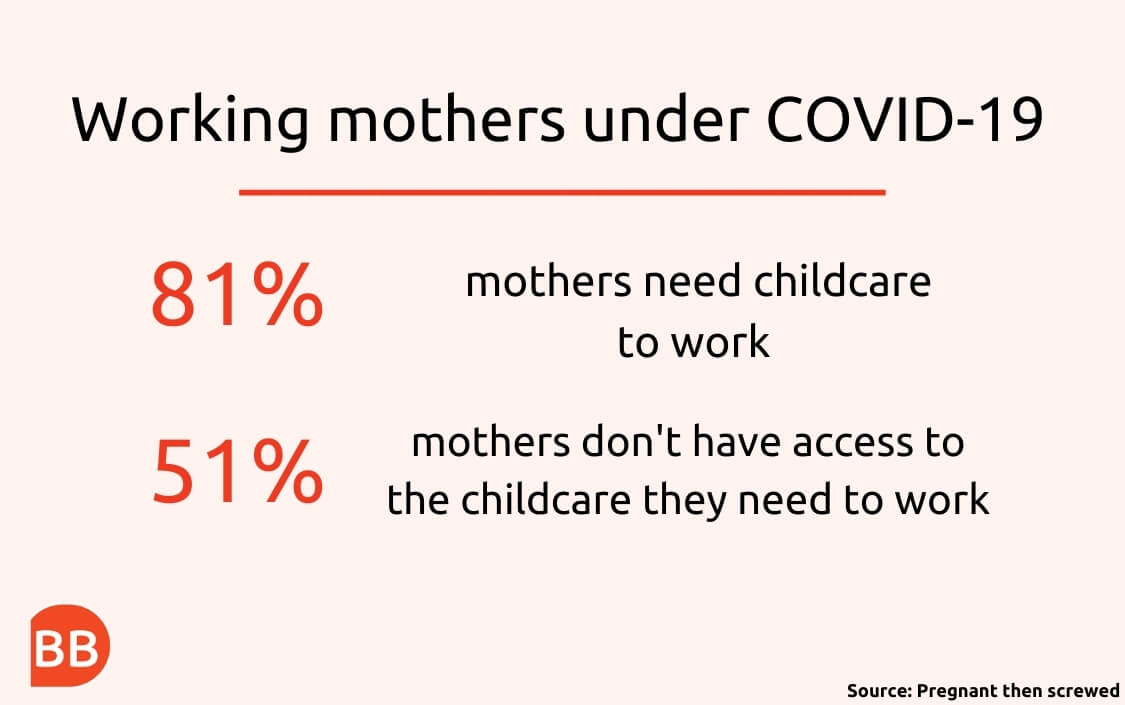COVID-19 has meant changes to business on all levels. But how has it effected women in particular?
At the beginning of the pandemic, the prospect of working from home was seen as a potential equalizer for women, allowing employers to hire from a more diverse pool of candidates, and offering more flexibility for female employees.
But the reality has not been that simple. The Harvard Business Review found that women are 1.8 times more vulnerable than men to lose jobs during this pandemic. Women make up of 39% of global employment but, as of May 2020, they account for 54% of overall job losses.
However, it's also been a time of innovation and change, especially among female business school students.
“It’s in women’s DNA to be adaptable, and get around circumstances like COVID-19”, says Huyen Nguyen, an MBA student at ESMT Berlin, and current VP of events at the recently founded Women In Leadership Club.
Setting up the club in a pandemic
The Women in Leadership Club at ESMT Berlin was founded as the pandemic began, and has adapted to the challenges of COVID with impressive speed. Its mission is to develop and empower the women to take on leadership roles, and build a community of advocates, supporters, and allies of advancing women. The club comprises of not only women, but also 30% men.
During the lockdown, the club set up events online and organised small group networking and talks with female industry leaders via Zoom, where these women shared their experiences and suggested how to face the work challenges they've been met with.
The club has also expanded its awareness on various social media channels such as Linkedin, Instagram and Facebook to share inspiring stories of women in business, in lieu of being able to meet them face to face.
One of the clubs initiatives is the ‘Lean-in-Circles Program’, which gives students a safe space to talk openly about everything from the challenges they face, to how to rally together in tackling them. “I did not know anyone in Germany before coming to ESMT,” says Madhusmita Triparthy (pictured right), one of the co-founders of the ESMT Women in Leadership Club. "The group members of my circle are like my family, and my go-to people here.”
Since COVID-19 measures started to ease in Germany, the club has already managed to have a face to face event- “Chat& Connect"- that helped the members to connect to the alumnae of the school.
They’ve also doubled down on their ambition to expand beyond ESMT, connecting to other Women in Leadership clubs across other business schools in Europe and creating a sustainable community.
How has COVID-19 affected female business school students?
The Women in Leadership Club is far from the only aspect of business school to be affected by the pandemic. Though many students are now back in the classroom, COVID-19 meant thousands of MBAs studied from home, and hybrid programs mixing on campus learning with online sessions are becoming normalized as a result of the pandemic.
The team behind the ESMT Women In Leadership Club describe mixed feelings about studying online. On one hand, they found it easier to communicate with the professors and studying at their comfort zone. But on the other hand understanding difficult concepts online was challenging with several technical issues cropping up every now and then and there was no fellow classmate to go to for clarifications.
“At times I kind of felt alone.” Madhusmita says. “I really missed that human touch and those important conversations with fellow classmates.”
“I have undervalued myself at work in the past—I wasn’t confident when presenting myself, and I know I’ve missed some opportunities in professional development because of that,” says Huyen (pictured right).
“Meeting other women who have experienced the same issues as you in the workplace is often a catalyst for change. COVID-19 means less chances to go out and talk to people in a casual environment and share your previous experiences,” Huyen explains. Informal, face to face networking is vital to progress, but it can be hard to recreate these meaningful relationships on zoom.
“Being a WIL club member made me realize about the different challenges women face on daily basis depending on from where they are” adds Beatriz Meythaler, fellow MBA student at ESMT Berlin, and VP- Communications of Women In Leadership Club.
"In Germany," she continues, "you can see women walking alone at night without fear. They can be independent and free at night. In Ecuador, where i'm from, the situation is completely different. As a woman, you cannot do that without putting your life at risk."
“Some Latin American friends, male and female, have shared with me how their perception about gender has changed through this club after becoming aware of the psychological challenges women face at work. Back at home they used such expressions as ‘you play like a girl’. Now, they are aware of the negative impact of using such expressions and avoid them”. Beatriz adds.
48 students represent 24 countries in the 2020 ESMT MBA cohort, and 40% of the class are women. The internationality of the cohort brings diverse perspective and enriches the classroom discussion at ESMT.
Though diversity in the classroom may be a harder resource to tap into in remote learning situations, initiatives like those of the Women In Leadership Club at ESMT are ensuring that progressive conversations and perspective sharing is still happening.
READ: 4 Ways An MBA Can Help You Navigate Uncertainty
How has COVID-19 effected women in the workplace?

Though innovations in the ESMT Women In Leadership Club are encouraging, women at the workplace have still been hit badly by the effects of COVID-19 on businesses. This is particularly true for working mothers.
A recent survey in the UK found that 81% of mothers needed childcare to be able to return to work, but only 51% of those women were able to access it.
“Society is changing, but progress has been very slow” says Beatriz (pictured right). “COVID-19 has made the progress even slower."
For mothers who can return to work, there are still obstacles. “Women are always treated as the primary caregiver of children,” says Madhusmita. “If everyone is working from home, it’s women who are compensating for childcare more than men.”
This is known as the invisible workload, where women are seen as the manager of the household, and therefore expected to stay on top of chores and childcare, creating what some call a ‘second shift’ in the home.
“We’re already overcompensating by putting extra efforts at work to ensure our managers do not feel that we are any less than our male counterparts. So adding the extra pressures in the form of unpaid-care is tough on women,” adds Madhusmita. She founded the club after witnessing the dearth of female leaders in her previous workplace at a top automotive company in India. This experience inspired her to work to change the patriarchal mindsets of fellow male colleagues.
When it comes to climbing up the ladder, doing everything online poses further challenges. Many businesses have successfully maintained the status quo through remote working, but are yet to get around how to best assess, promote and hire fairly during a pandemic.
Moreover, working from home has increased the burnout rate among women who are juggling between office responsibilities and other duties at home, resulting in increased stress levels.
But such issues have only encouraged the Women In Leadership Club to double down on their ambitions. The next goal for club is to organize a women in leadership conference next year, that would have a greater scope, attract a larger audience and host top women leaders across different industries.
“If we want to promote an inclusive mindset and gender equality at work,” Madhusmita concludes, “we need to come together and speak about it.”





